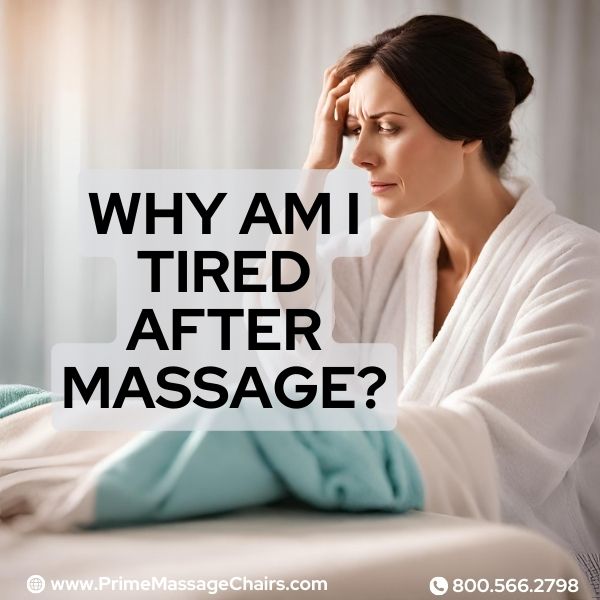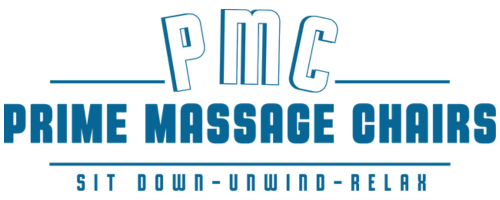
Tired After Massage? Understanding The Fatigue Factor
Are you wondering why you're so tired after massage? It's common for the calming effects of massage therapy to leave people feeling sleepy.
This article will guide you through why your body reacts this way and how you can embrace and manage post-massage fatigue.
Keep reading to unlock the secrets behind that post-massage slump!
Understanding the Massage Process
Massages make your body feel good in different ways. They help push more blood through your veins and calm down the nerves that control when you are awake or relaxed. Your massage therapist uses their hands, fingers, and sometimes elbows to press and rub muscles all over your body.
This touch can tell your brain to stop thinking about stress.
As they work on sore spots or knots, they also use special moves that can relax very tight muscles. These skills come from learning things like Swedish massage or deep tissue massage.
Both kinds help loosen up muscles by pressing and gliding over the skin with oils. Your whole body may start to slow down as it gets used to being so calm during a massage session.
Why Do You Feel Tired After a Massage?
Feeling tired after a therapeutic massage might seem counterintuitive, yet it's a common reaction as your body delves into its healing mode.

This post-massage fatigue stems from the intricate dance of physiological responses working to restore and relax your deepest tissues and mental state.
Deep Relaxation
Your body gets very calm during a massage. The massage makes your brain quiet and blocks out noises and lights from outside. This helps you to feel peaceful and can make you want to sleep.
Your muscles also get a break, which adds to this restful feeling.
Next is how your heart rate goes down after a good massage.
Lower Heart Rate
Massages are great for making your heart beat slower. As you relax, your body goes into a "rest and digest" state. This is when the autonomic nervous system calms everything down. Because of this, during and after a massage, your heart doesn't have to work as hard.
Getting massaged makes blood flow better too. This helps lower your blood pressure along with your heart rate. So, if you feel tired after getting a massage, it might be because of these changes in how fast your heart beats.
Now let's talk about how massage helps take away pain.
Pain Relief
Getting a massage can make you feel less pain. Your muscles get to relax deeply, which help your body stop sending so many pain signals. This is like telling your muscles, "It's okay to take it easy now." Because of this, your heart doesn't have to work as hard and beats slower.
This calm feeling can make you want to sleep and leave you feeling drained after the massage.
Your mind also gets a break during a massage because good chemicals like serotonin and dopamine are let out by your brain. These are the body’s natural helpers that make us happy and chill out.
So after pushing away the hurt in our bodies, we might feel wiped out because we're finally letting go of tension we didn't know was there. With the hurt going away, it's normal for tiredness to come over us as we start healing.
Reduced Stress Levels
After a massage, your body can feel at ease, which often means stress melts away. A good massage helps to calm the mind and lower heart rate. This can make you feel more relaxed than before.
When stress goes down, your body's need to fight or stay alert fades too. This switch is thanks to the parasympathetic nervous system taking over. It slows things down inside you and lets your body rest and digest food better.
Less stress also changes brain chemistry in a good way. Hormones that make you feel happy go up, while those that cause worry or fear go down. Your muscles get to take a break, and this new balance in the brain helps keep them loose and free from tension for a while longer.
That’s why after a massage focused on stress relief; you may find yourself wanting to sleep or just lay back in comfort – it's all part of getting back energy by first letting your guard down fully.
The Connection Between Massage and Fatigue
Massages can make you feel tired because they help your body to slow down. Your muscles get worked on, and this tells your brain it's time to rest. This is like after a good workout when you feel ready for a nap.

Also, massages can relieve pain, which often takes away energy. When the pain goes away, your body might feel worn out from dealing with it before.
Your heart rate often goes down during a massage because you are so relaxed. A slower heart rate means less work for your body and sometimes that makes you sleepy too. With less stress, your body doesn't have to stay as alert, so it feels safe to let go and be tired.
Next up are different kinds of massages that may also make you want to curl up in bed afterward!
Massages That May Cause Fatigue
Certain massage techniques can lead to a surprising wave of fatigue post-session.

These particular styles, while beneficial, often invoke a deeper relaxation response or significant physiological changes that contribute to the sensation of tiredness.
Deep Tissue Massage
Deep tissue massage works hard on your body. It uses lots of pressure to get to the deeper muscles. This type of massage is strong and reaches far into muscle layers, making it a common cause of feeling tired afterward.
It helps lower blood pressure, boosts blood flow, and affects your nervous system.
Next, we'll talk about how this all connects to feeling wiped out after a massage.
Swedish Massage
Moving from the intensity of deep tissue massage, Swedish massage is a gentler form that still packs a punch in making you feel tired. This type of full-body massage focuses on long, smooth strokes and kneading to help relax your muscles.
It's really good for deep relaxation and can make your heart rate go down. Your whole body gets calm during a Swedish massage, which helps take away pain and cut down stress levels.
You might walk out of a session feeling super relaxed, only to find yourself wanting to sleep soon after. That's because Swedish massages are great at changing how your blood pressure works and how blood flows through your body.
These changes are why you might feel wiped out right after the massage. But don't worry! After this initial sleepy feeling passes, most people notice they actually have more energy than before because their bodies had time to rest and repair.
Trigger Point Massage
Trigger point massage tackles tight spots in your muscles that can cause pain elsewhere. When a massage therapist presses on these areas, it might hurt at first. But after the pressure is lifted, you often feel relief.
This type of massage goes deep to get rid of knots and ease muscle tension. At times, working through these spots can tire you out because your body is healing. Yet, many people notice they have more energy once they recover from the initial sleepiness.
Next up, let's talk about what steps you can take to help your body bounce back after a massage session.
How to Help Your Body Recover
Feeling tired after a massage is normal. Your body needs time to reset and gain energy back.
- Drink lots of water: After a massage, drink plenty of water. This helps get rid of any toxins released from your muscles. Staying hydrated can also help to prevent muscle soreness.
- Rest if you need to: Listen to your body. If you feel sleepy, take it easy and give yourself time to rest. A short nap can help your body heal.
- Eat healthy food: Choose foods that are good for you and easy to digest like fruits, vegetables, and lean protein. Good food gives your body the nutrients it needs to recover faster.
- Avoid heavy exercise: Right after a massage, don't do hard workouts or lift heavy things. Your muscles are relaxed, so they need time before doing big tasks again.
- Take a warm bath: Soaking in warm water can keep you relaxed and soothe any sore spots from the massage.
- Breathe deeply: Deep breathing can help your body stay calm and speed up recovery after a massage.
FAQs
Why do I feel so tired after a massage?
You might feel tired after a massage because your body is relaxed and it can reduce stress, leading to a state of deep rest, similar to how you feel right before falling asleep.
Is it normal to need rest after getting different types of massages?
Yes, it's normal! Your body may need time to recover, especially if you had a deep tissue or therapeutic massage which works deeply into your muscles.
Should I drink water after having a full body massage?
Absolutely! Drinking water helps hydrate your body and can help get rid of any toxins released during the massage.
Can massages affect my mood or emotions?
Sure can! Massages often relieve stress which might change how you're feeling and leave you more relaxed or even sleepy afterward.
What should I expect my sleep quality to be like after getting massaged?
Many people find their sleep improves after a massage because they are less tense and this may help with sleep disorders too!
How does massage therapy help with pain management?
Massage therapists use their skills in manual therapy to ease muscle tension which helps manage pain from things like injuries or conditions including back rubs that make you relax.
Conclusion
If you get tired after a massage, now you know it's pretty normal. Your body is just taking a break and healing up inside. Remember to drink water and rest well.
However, it's important to note that while massage can lead to feelings of relaxation and reduced fatigue, the exact response can vary depending on individual factors such as the type of massage, the individual's physical and mental state, and the context of the massage (e.g., therapeutic vs. relaxation).
Give your body time to bounce back and enjoy those good massage vibes! Soon enough, that sleepy feeling turns into fresh energy.
Disclaimer:
We do not provide medical advice. The content of this article, including text, graphics, and other material, is for informational purposes only. It is not intended to be a substitute for professional medical advice, diagnosis, or treatment. Always seek the advice of your physician or other qualified health provider with any questions you may have regarding a health condition. Never disregard professional medical advice or delay in seeking it because of something you have read in this article or on our website.
